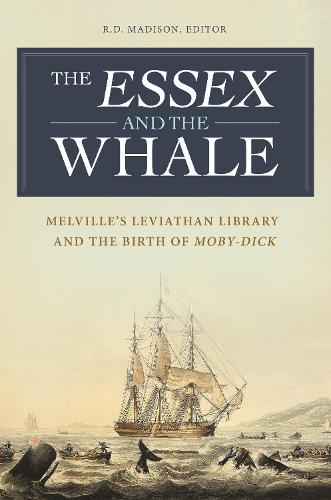
The Essex and the Whale: Melville's Leviathan Library and the Birth of Moby-Dick
(Hardback)
Publishing Details
The Essex and the Whale: Melville's Leviathan Library and the Birth of Moby-Dick
By (Author) R. D. Madison
Bloomsbury Publishing PLC
Praeger Publishers Inc
28th March 2016
United States
Classifications
Tertiary Education
Non Fiction
Literary studies: c 1800 to c 1900
813.3
Physical Properties
Hardback
320
Width 156mm, Height 235mm
765g
Description
This fascinating anthology introduces readers to the literary side of Herman Melville's whaling world with an unprecedented collection of the original whaling texts from which Melville drew to create his masterpiece, Moby-Dick. The notorious 1820 sinking of the whaleship Essex inspired Herman Melville's Moby-Dick, as recounted in Nathaniel Philbrick's bestselling book In the Heart of the Sea: The Tragedy of the Whaleship Essexnow a major motion picture. But how exactly did Melville transmute the historic tragedy of the Essex into what is arguably the "Great American Novel" Here, for the first time, R.D. Madison collects together Melville's personal "library" of whaling and whale-lore into a single volume and presents these primary sources in a way that readers can readily see how a horrific whaling tragedy became a literary masterpiece. But where did Moby-Dick begin Prompted by sailor-author Richard Henry Dana, Jr., Melville supplemented his own firsthand experience as a whaleman in the South Pacific with "libraries" of books that he "swum through" to create his whaling masterpiece. Scholars and lay readers alike have long wondered how he did it, and over the past 60 years, a very tight theory of inspiration and creation has emerged. It is very likely wrong. This volume gathers together for the first time all of the main texts that Melville encountered, including the accounts of the unique sinking of the Essex by a sperm whale that provided the climax for Moby-Dick. Melville scholar R. D. Madison examines what critics have said about Melville's response to the sinking and offers the challenging thesis that Melville did not even begin the book at all until spurred on by Dana in the spring of 1850.
Reviews
Madison's book is most valuable, however, for its inclusion of less prominent yet still interesting writers who touched Melville's literary sensibilities. . . . Summing Up: Recommended. Lower-division undergraduates and above; general readers. * Choice *
Top Community College Resource, September 2016 * Choice *
Author Bio
R. D. Madison is professor emeritus of English at the U.S. Naval Academy.
